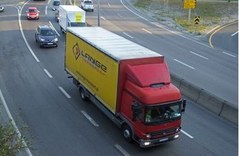East meets Nordics in EU road transport show-down
The Nordic countries are celebrating that the EU has finally approved rules aimed at fighting social dumping in the international road transport sector. Meanwhile, a number of low-pay countries in the east have asked the EU Court of Justice to annul them.
The road transport market is more regulated than the market for other services in the EU. The main rule is that transport operators are only allowed to carry out work within a national market when this is inside the member state where they are established.
The exemption is if the operator delivers goods from its home country to a recipient in a different member state. It can then carry out transport inside that country’s national market on the way back from the cross-border job – so-called cabotage.
The Nordic countries have regularly complained about foreign operators abusing the cabotage system to stay and carry out domestic jobs on a near-permanent basis, while their drives are paid as if they were working in their home countries.
So it was considered a big step forward when in the summer the European Parliament and the Council of the European Union managed to agree on a comprehensive “road package” which would give drivers better working conditions and tighten the rules on cabotage.
Inter alia, employers must now pay for drivers’ lodging during their weekly rest, which cannot be spent in the cabin of the vehicle. In order to prevent the possible misuse of driving cabotage and use letterbox companies, the drivers and the vehicles must also regularly return to their home country.
These rules are now being fought by at least six countries – Bulgaria, Lithuania, Malta, Poland, Rumania and Hungary (more might join). They argue that the rules discriminate against member states on the fringes of Europe’s borders and that they will lead to increased pollution because drivers and vehicles must return with regular intervals.
They might get support on that last point from the European Commission, which opposed the rules during negations, claiming they were incompatible with EU’s climate goals and the so-called Green Deal.
As a result, the Commission is now analysing the consequences the new rules might have for the climate, the environment and the functioning of the internal market. It could also propose new legislation to prevent the new rules coming into force. And most Eastern European countries are cheering it on.


 Follow us on Facebook
Follow us on Facebook
